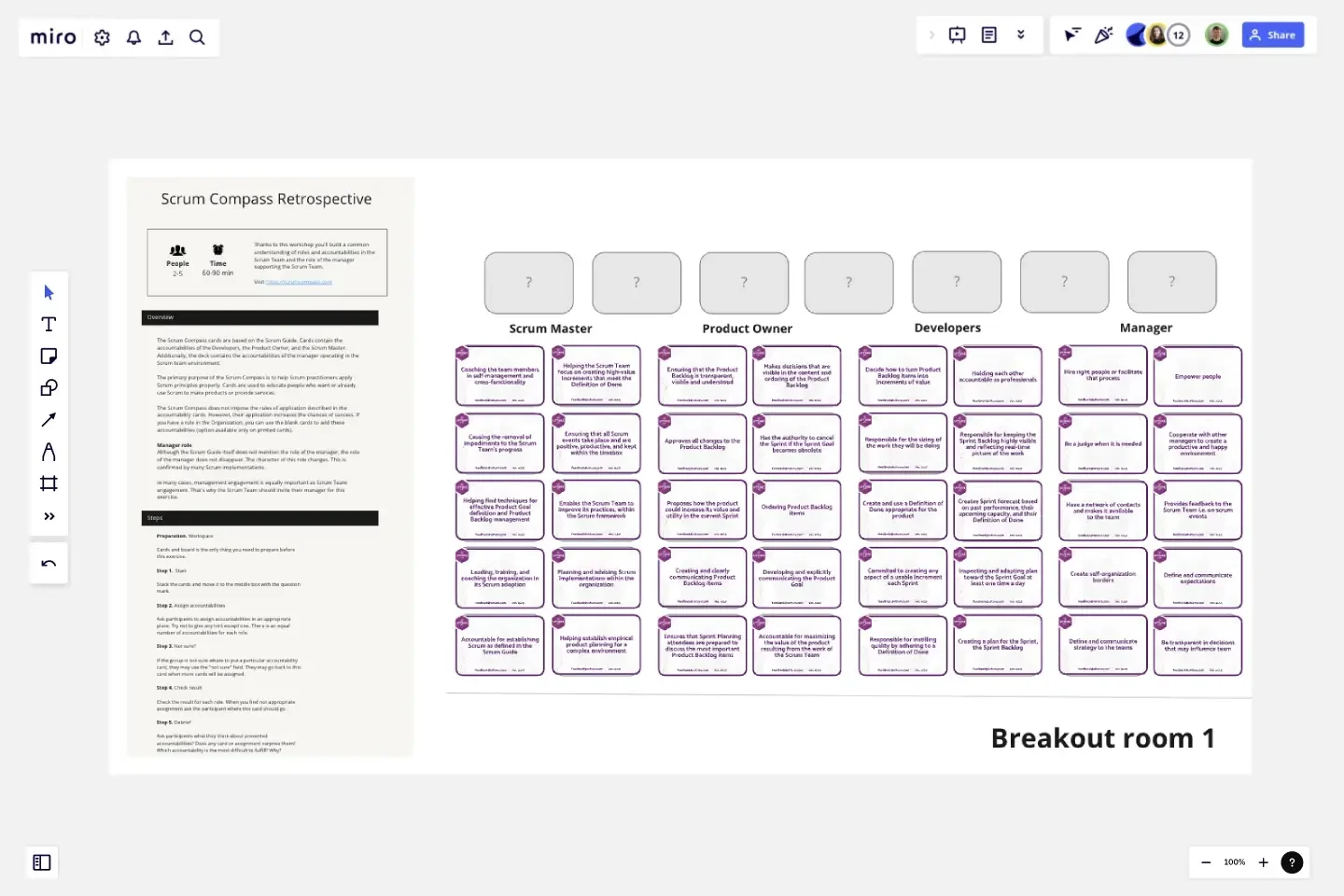Scrum Compass
The Scrum Compass cards are based on the Scrum Guide.
Cards contain the accountabilities of the Developers, the Product Owner, and the Scrum Master. Additionally, the deck contains the accountabilities of the manager operating in the Scrum team environment.
Although the Scrum Guide itself does not mention the role of the manager, the role of the manager does not disappear. The character of this role changes. This is confirmed by many Scrum implementations.
The primary purpose of the Scrum Compass is to help Scrum practitioners apply Scrum principles properly. Cards are used to educate people who want or already use Scrum to make products or provide services.
The Scrum Compass does not impose the rules of application described in the accountability cards. However, their application increases the chances of success. If you have a role in the Organization, you can use the blank cards to add these accountabilities (option available only on printed cards).
This template was created by Tomek Pawlak.
Retrospective - Christmas Edition
Works best for:
Agile Methodology, Retrospectives, Meetings
The Retrospective Christmas Edition template offers a festive and themed approach to retrospectives, perfect for the holiday season. It provides elements for reflecting on the year's achievements, sharing gratitude, and setting intentions for the upcoming year. This template enables teams to celebrate successes, foster camaraderie, and align on goals amidst the holiday spirit. By promoting a joyful and reflective atmosphere, the Retrospective - Christmas Edition empowers teams to strengthen relationships, recharge spirits, and start the new year with renewed energy and focus effectively.
SIPOC Process Map
Works best for:
Agile Metodology
The SIPOC Process Map is a visual tool for documenting the high-level process flow of a system or project. It helps teams identify Suppliers, Inputs, Processes, Outputs, and Customers, facilitating a holistic understanding of the value stream. This template enables teams to visualize key process elements and interdependencies, empowering them to identify areas for improvement and optimize workflow efficiency. By promoting transparency and collaboration, the SIPOC Process Map empowers organizations to deliver value more effectively and satisfy customer needs.
Sprint Review Template
Works best for:
Sprint Review, Agile
The Sprint Review Template is a vital tool in Agile project management that enhances communication between team members and stakeholders by providing a clear format for presenting the sprint's accomplishments and challenges. It encourages active participation and feedback from all attendees, leading to more informed decision-making and continuous improvement. In essence, it's a catalyst for meaningful dialogue and collaborative growth.
Agile Transition Plan Template
Works best for:
Agile Methodology, Agile Workflows
An Agile transformation roadmap can help you, your team, and your organization transition from rigid compliance-heavy methods to the more flexible Agile way of doing things incrementally. From requirements to integrations to security, you can map out your organization's moving parts as “swim lanes” that you can then update regularly. Use your roadmap as a way to tell the story of how you see your product growing over a period of time. Get buy-in without overselling and keep your roadmap simple, viable and measurable. By using an Agile transformation roadmap, you can avoid getting bogged down in details and instead invest in big-picture strategic thinking.
Penny Game
Works best for:
Agile
The Penny Game is a simulation exercise that illustrates the impact of batch size and work in progress on cycle time and throughput. By tracking the flow of pennies through a production system, teams learn how to identify bottlenecks, optimize processes, and improve efficiency. This template offers a practical way to explore Lean principles and drive continuous improvement, empowering teams to streamline their workflow and deliver value more predictably.
Design Sprint Kit Template
Works best for:
Agile Methodology, UX Design, Sprint Planning
With the right focused and strategic approach, five days is all it takes to address your biggest product challenges. That’s the thinking behind Design Sprint methodology. Created by Tanya Junell of Blue Label Labs, this Design Sprint Kit provides a set of lightweight templates that support the Design Sprint’s collaborative activities and voting—and maintains the energy, team spirit, and momentum that was sparked in the session. Virtual sprint supplies and prepared whiteboards make this kit especially useful for remote Design Sprint Facilitators.
